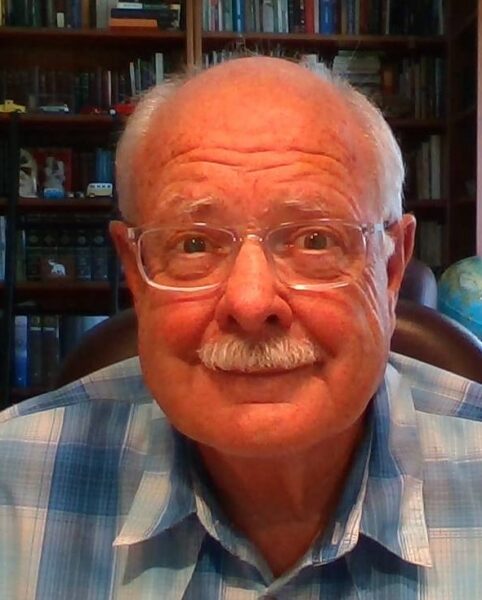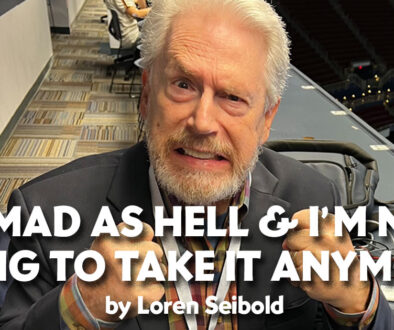God Is the Biggest Loser
by Jack Hoehn | October 27, 2023 |
My wife Deanne claims that when I am winning a game, I am talkative and want to discuss every play; when I am losing, I am quiet and sullen and bored and soon “want to do something else.” She is competitive enough that I can’t deny her observation, since losing games to her is a skill I am very good at.
So yes, I would rather be a good winner than a good loser.
It should be remarkable, but for many years it escaped my attention that the most durable and influential of holy books in human history is almost entirely focused on the failure and defeat of humans and their God. Who else could compete for God’s title as “The Biggest Loser”?
Did God win in Eden? Was Noah’s flood a victory lap? What was the outcome of Jacob’s family moving to Egypt even if Joseph welcomed them? Did Moses get the former slaves the few-week journey into Canaan? Not in a few weeks and not with him, and once there how did the 12 tribes really get along? God selected “judges”—winners like Samson? Jephthah? And even the from-childhood-selected Samuel was fully rejected by his “chosen people.” Saul, God’s king-select, spent years trying to kill his replacement. David was a great warrior but his kingdom did not survive a profligate son.
Adam Gopnik summarizes it in this way: “The Hebrew Bible, or Old Testament is, perhaps unique on the planet…so entirely a loser’s tale. The Jews were the great sufferers of the ancient world—persecuted, exiled, catastrophically defeated—and yet the tale of their special selection, and of the demiurge who, from an unbeliever’s point of view, reneged on every promise and failed them at every turn, is the most admired, influential, and permanent of all written texts.”
What about the New Testament?
But we are Christians, so out with the Old and on with the New? Ride on, King Jesus—to Calvary, where Jesus asks, in his Aramaic, “Eloi, Eloi, Lama Sabachthani?” My God, my God, why have you forsaken me?
Gopnik again: “Whatever scholars conclude, though, the force of the Christian example surely lies in the extremity of the deity’s abasement, tortured to death in the most humiliating imaginable way and left to be buried as a criminal.” Is he wrong to suggest that the Christian religion focuses on Christ’s death–he sees that crucifixes are more common in Christian churches than images of the ascension.
“Jesus tended to honor the losers of this world, not the winners. Our modern culture extravagantly rewards beauty, athletic skill, wealth, and artistic achievement, qualities which seemed to impress Jesus not at all.” — Philip Yancey
Paul, Christ’s greatest proponent, admits (1 Corinthians 4:9-13, Phillips):
I sometimes think that God means us, the messengers, to appear last in the procession of mankind, like the men who are to die in the arena. For indeed we are made a public spectacle before the angels of Heaven and the eyes of men. We are looked upon as fools, for Christ’s sake, but you are wise in the Christian faith. We are considered weak, but you have become strong: you have found honour, we little but contempt. Up to this very hour we are hungry and thirsty, ill-clad, knocked about and practically homeless. We still have to work for our living by manual labour. Men curse us, but we return a blessing: they make our lives miserable but we take it patiently. They ruin our reputations but we go on trying to win them for God. We are the world’s rubbish, the scum of the earth, yes, up to this very day.
Losing propositions
Adventists and every other denomination badly want to explain why our Bible mandates the execution of disobedient children. Or why God is presented by the “holy men of old” as commanding genocides. 50% of our membership between ages 13 and 50 struggle with a Bible that treats menstruating women as unclean and a God who made them menstruate. So, who is the Biggest Loser? Naughty children, fallible holy men of old, all women, or God?
None of us today know the exact date of Ellen White’s birth; how can we claim to know the date of the earth’s birth? Jesus didn’t come back October 22, 1844, nor within the lifetime of anyone who expected him on that day. “Soon” is no longer soon by any yardstick. Not soon by 4.6 billion years of solar history. Not soon by 2,000 years since the apostles gazed after Jesus into the sky. Not soon for the oldest living baptized member of the Seventh-day Adventist church.
Jesus said he was the Lord of the Sabbath, why do we claim that Saturday-worshiping Adventists are lords of the Sabbath, and all the rest are beasts or beast worshipers? The seventh day surely is the Sabbath, but where is the humility on either side of the international date line? Where is the recognition of a Friday night holiness that is not Biblical, but intertestamental tradition. Where is the Christian generosity that says we would wish you a Thursday, Friday, or Sunday Sabbath rather than no Sabbath at all? Why don’t we demonstrate our Sabbath instead of legislating the Sabbath?
Losers all
Each of us in our short lifetimes has been wrong. We have all lost. We are all losers. In the end, life is always lost. The fallenness of humankind is the only doctrine that has irrefutable proof. Why not admit that the fallenness of Adventist doctrines is equally so? Of course, we have been wrong. Of course. we have to repent of our misperception of truth and improve our errors. Of course, we have to unlearn some of our ideas and learn better ones. Why is this so hard to admit?
If our Adventist God lost 1/3 of his angels, 100% of his first humans, and most of his plans outlined in the Bible for their salvation and governance, then our God is the Biggest Loser. Love is the way of losers. Nice guys come in last, on earth and in Heaven. Our good God freely “repents” of what he has done, and finds salvation in the defeat of his plans.
If Adventist organizations were tasked with improving our doctrines instead of defending them, then how exciting better understandings of truth might be from the Biblical Research Institute or the Geo-Science Institute with new ways of understanding creation; or if we really had an organization where “Faith for Today” meant a changed, improved, updated faith to present to the world, instead of “Faith of Yesterday’s Misunderstandings Defended” that it unfortunately seems to be?
Today why would any Seventh-day Adventist anyplace, anyhow, anytime still be found guilty of the sin of certainty, the sham of inerrancy, and the fraud of claiming our ancestors had unvarnished truth? How eager should we be to admit our errors, correct our misunderstandings, and how humble in our dealings with other faiths? I may be wrong, of course, but I am sure of one thing—so are all of us. And our God wants us to freely and openly admit it. In the economy of Heaven, it is good losers who win.
 Jack Hoehn is the author of the best-selling book that Adventist Today has published, Adventist Tomorrow—Fresh Ideas While Waiting for Jesus. It is available in Kindle electronic versions or as a newly published paperback version with more readable type from Amazon.com. Adventist Tomorrow is based on admitting our need to keep progressing the Adventist understanding of truth. It discusses in more detail why we and orthodox Jews traditionally start the Sabbath at sundown Friday night instead of Sabbath daylight as the commandment says. The concept of a God who loses because of freedom of choice is also discussed in the chapters on the openness of God and inspiration of both the Bible and Ellen White.
Jack Hoehn is the author of the best-selling book that Adventist Today has published, Adventist Tomorrow—Fresh Ideas While Waiting for Jesus. It is available in Kindle electronic versions or as a newly published paperback version with more readable type from Amazon.com. Adventist Tomorrow is based on admitting our need to keep progressing the Adventist understanding of truth. It discusses in more detail why we and orthodox Jews traditionally start the Sabbath at sundown Friday night instead of Sabbath daylight as the commandment says. The concept of a God who loses because of freedom of choice is also discussed in the chapters on the openness of God and inspiration of both the Bible and Ellen White.




